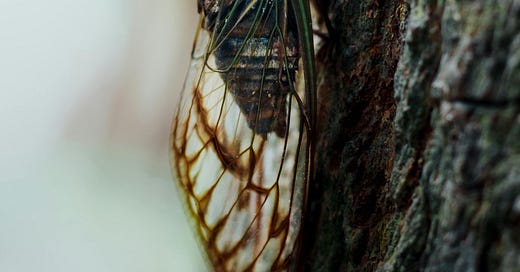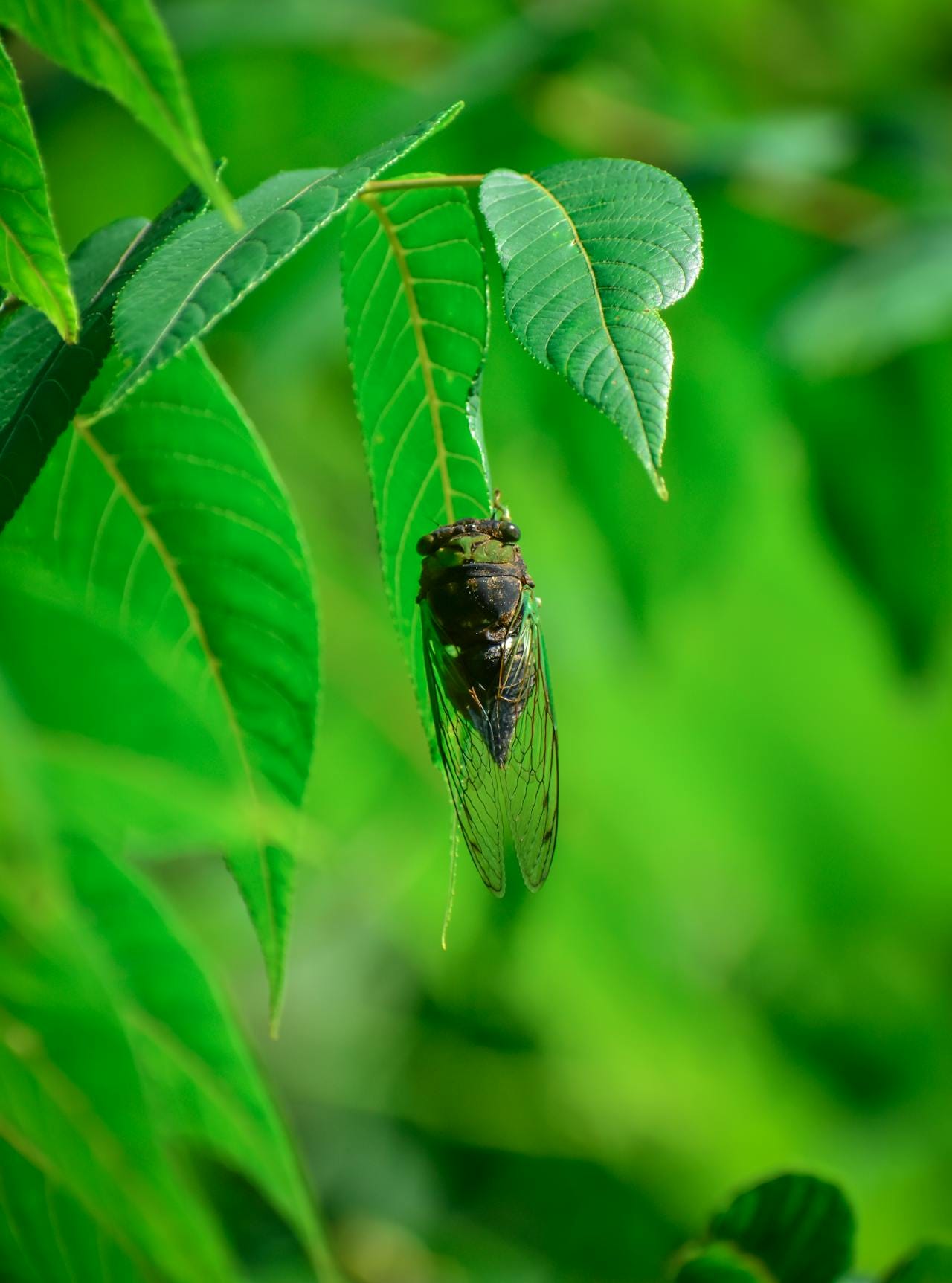Trillions Of Cicadas are Coming… Oh Joy
You’ve probably heard by now, but just in case you haven’t, trillions of cicadas are about to erupt from the ground, and entomologists everywhere are absolutely thrilled. As they will joyously tell you, the simultaneous emergence of two broods, Brood XIX and Brood XIII, is a rare event that hasn’t happened since Thomas Jefferson was president. In a recent article in The Guardian, John Cooley, a cicada expert at the University of Connecticut, says “Sit back and be in awe at the spectacle. It will be over soon enough. Then think about where you will be in 13 or 17 years. It’s a time for introspection.” This momentous occasion could start as early as the end of this month and last for about six weeks. They say the combined noise of the broods is as loud as a motorcycle revving. Really? A motorcycle revving in my backyard?
All I can say about this miraculous emergence of two broods at once is, it sucks. Let me share some of my introspective thoughts about this natural wonder. First, it’s spring and I don’t want to listen to motorcycles revving when I’m out in the garden. My morning patrols are peaceful affairs where I get to listen to the songs of the birds while pulling a few weeds or even pruning and cleaning up a bed or two. In my wildest imagination I didn’t think motorcycles revving would be part of the picture. It’s not like listening to loud music, you know. The cicadas send up a roar of buzzing noise that is impossible to escape if you are outside your house (and maybe if you’re inside your house.) I’ve been thinking that the solution might be to find a Spotify soundtrack that I could play so loudly while I’m gardening that it would drown out the cicada buzzing. I have no idea what kind of heavy metal music it would take to get the job done, but I’m certain that if I played it at the volume necessary to not hear the cicadas, I would end up deaf, anyway.
The other thing about this miraculous occurrence is that it is going to take place during the one time of the year that I most enjoy. Spring is a magical time in the garden. After waiting all winter to enjoy the rebirth of my perennial plants, I really think having to listen to the Daytona 500 when I go outside for six weeks or so is a rip-off. And it’s not just the noise. We all know that these creatures, which the experts tell us won’t bite us or sting us, are a nuisance when they fly in hordes around your property. I hate it when they touch me, as my anti-insect instincts take over and I end up crushing these poor, well-meaning creatures under my shoe. Catherine Dana, an entomologist at the University of Illinois, says “It’s really exciting. I’ve been looking forward to this for many years. For the public this is going to be a really special experience.” Well Catherine, no offense, but this is one experience I could miss, if you know what I mean.
A recent online article in Better Homes in Gardens (bhg.com) gives us some gardening tips for the cicada hell that is coming our way. Floyd W. Shockley, an entomologist and collections manager at the Smithsonian National Museum of Natural History, says that instead of throwing dead cicadas away, “People should use them as free fertilizer for the plants in their garden and natural areas.” Plus, the holes they leave behind can help aerate the soil and get more water to the plants. Mr. Shockley says, “Nobody alive today will see it happen again. That’s really rather humbling.” (I can see why entomologists have lost their mind over this; they make their living studying bugs and this is one of the biggest bug events in their lifetimes.) I’m trying to imagine my beautifully mulched, perfectly manicured spring flower beds with a thick layer of cicada corpses spread on top. I don’t think so.
For perennial gardeners, the good news is that the plants at biggest risk are bushes and trees, particularly sapling trees, ornamental shrubs, blueberries, grape vines, bramble fruits, oaks, maples, cherries, dogwoods, and redbuds. The bugs eat the sap from trees and slice into the bark to lay their eggs. It seems putting netting around your young trees is the best thing to do. I don’t see any of my perennials on this list, which I consider to be very good news. And if I seem to be coming across as somewhat selfish, I guess I am.
It brings to mind a quote from one of my favorite movies, “Shawshank Redemption,” which is set in prison. The narrator, Red Redding, played by Morgan Freeman, says, “I’ve had some long nights in the stir. Alone at night, with nothing but your thoughts, time can draw out like a blade.” I’m thinking we are all about to face a six-week stint in the stir, where during the prettiest time of the year we will find ourselves holed up in the house waiting for the ungodly racket to subside. The garden work must get done that time of year, so I will brave the hurricane of flying beasties because weeds need to be pulled, beds need to be mulched, and plants need to be tended. And yes, I will probably experiment with earbuds to see if I can find some measure of peace by listening to music against the roar of the cicadas.
A few more quick quotes from The Guardian article I mentioned earlier. Catherine Dana, our favorite entomologist from the University of Illinois says, “I like to remind people this is a natural wonder of the world. You just don’t see this biomass of terrestrial life anywhere else.” According to the article, some Americans are actually planning trips in order to see hot spots of cicadas. If you happen to be one of those people, save yourself some airfare and come on over to my place. I recall from the last time the cicadas visited: We have a few hot spots right down the street. With my luck, the hottest spot will be in my backyard.
You may not know this, but a recent archaeological find at Monticello, the Virginia home of Thomas Jefferson, revealed a cache of previously unknown documents. Several were filled with phrases that eventually made it into The Declaration of Independence. For example, Tom was experimenting with the phrase, “men have the unalienable right to life, liberty, and the pursuit of happiness.” They found other pages where Tom was bemoaning the fact that Alexander Hamilton wasn’t around anymore when Tom was trying to figure out some tricky financing for the Louisiana Purchase. But, most relevant for us, there were several pages buried under all the others where he wrote to Edmund Bacon, the business manager and overseer of Monticello for 20 –years. “Those cursed insects are setting off such a racket that I can barely hear myself think,” Jefferson wrote. “Please do something about it.”
In just a few weeks, I’m afraid, we are going to know just how Thomas felt.
Author’s note: There was no recent archaeological find with letters referring to Brood XIX and Brood XIII. It was fun imagining Thomas Jefferson dealing with the noise, though. And Edmund Bacon actually was Jefferson’s overseer. I hate to think what he was doing on the plantation when he wasn’t chasing cicadas.
Thanks to my long-suffering editor, Molly Glassman, who did some additional research to find out the University of Maryland Extension Service says that were only getting Brood XIX in the state, and only in St. Mary’s County. Hopefully we all get lucky.
Note to readers: If you are looking for an easy way to find the archives for the blog, try clicking on the small images of me at the top of the blog post. The small round or square images should take you directly to the archive. Happy reading.






